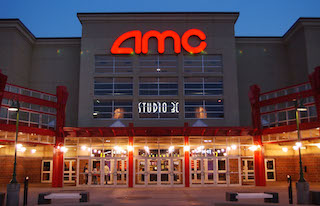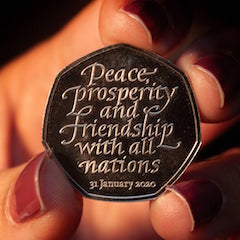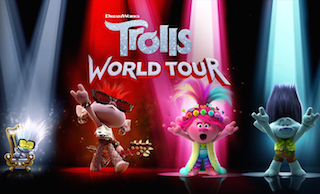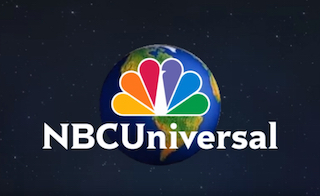 Movie theatres worldwide continue to struggle simultaneously with the ongoing effects of both COVID-19 and a lack of first run movies to show their anxious patrons. What, then, will the pandemic’s long-term impact be on a business that is more than a century old? Incredibly, the biggest issue facing the UK exhibition industry as we blindly turned the corner into 2020 was Brexit. Scary and pointless to some, justified and overdue to others, it was heralded as a great success by a few high profile, self-serving politicians but barely acknowledged by the vast majority of UK voters, exhausted after four years of endless debate, negotiation and re-imagined expectations. The exit date of January 31 came and went with little fanfare in the end. A bland, commemorative Brexit 50p coin seemed to hit just the right level of anticlimax at the time. Is that it? After all that?
Movie theatres worldwide continue to struggle simultaneously with the ongoing effects of both COVID-19 and a lack of first run movies to show their anxious patrons. What, then, will the pandemic’s long-term impact be on a business that is more than a century old? Incredibly, the biggest issue facing the UK exhibition industry as we blindly turned the corner into 2020 was Brexit. Scary and pointless to some, justified and overdue to others, it was heralded as a great success by a few high profile, self-serving politicians but barely acknowledged by the vast majority of UK voters, exhausted after four years of endless debate, negotiation and re-imagined expectations. The exit date of January 31 came and went with little fanfare in the end. A bland, commemorative Brexit 50p coin seemed to hit just the right level of anticlimax at the time. Is that it? After all that?
Save for a few isolated fireworks that night, most of us put Brexit and the 12 month transition period to the back of our minds and turned the volume up on the news, which back in January was barely mentioning the coronavirus.
Fast forward to March 4. We were uncertain whether to shake hands, hug or just do nothing at the UK Cinema Association Conference in London; doors were being opened with sleeves and a new term, COVID-19, was a feverishly hot topic; a few glasses of wine later though, that was also at the back of our minds and we were yet to hear anyone carping on about social distancing or personal protective equipment. The UK was locked down on March 23 and then we heard all about it. Cinemas closed and we turned to box sets, Whatsapp and home deliveries. We had no idea what lay ahead.
 The Dunkirk spirit was strong with Disney though. “We are in this together,” they proclaimed, assuring panicky exhibitors knee deep in furloughing staff, even as release dates for tentpoles like Peter Rabbit and James Bond were put back six months. Echoes of this sentiment were heard industry-wide and as the shutters went down, at least everyone felt they were in the same boat. Jittery speculation via industry zoom calls soon fizzled out once we realized nobody actually had a clue what was going to happen next. We got on with baking cakes, doing jigsaws and trying to stay out of A&E.
The Dunkirk spirit was strong with Disney though. “We are in this together,” they proclaimed, assuring panicky exhibitors knee deep in furloughing staff, even as release dates for tentpoles like Peter Rabbit and James Bond were put back six months. Echoes of this sentiment were heard industry-wide and as the shutters went down, at least everyone felt they were in the same boat. Jittery speculation via industry zoom calls soon fizzled out once we realized nobody actually had a clue what was going to happen next. We got on with baking cakes, doing jigsaws and trying to stay out of A&E.
Then the Universal row with AMC over Trolls World Tour erupted, and the calm that had fallen across the sector was suddenly a storm. The National Association of Theatre Owner’s appeal for reasonableness and AMC’s shrill response that it “represents nothing but downside for us and is categorically unacceptable” was in stark contrast to Disney’s soothing noises barely a month earlier. In April NBCUniversal CEO Jeff Shell told the Wall Street Journal “that even after cinemas reopened, the company would keep releasing films in both formats,” an aggressive, unanticipated move which did little to endear the studio to its detractors, already fuming all over Twitter, LinkedIn and Facebook.
NATO’s own uppity statement that “Universal has a destructive tendency to both announce decisions affecting their exhibitor partners without actually consulting with those partners, and now of making unfounded accusations without consulting with their partners” merely served to underline the fragile, handshake nature of the relationship between distributor and exhibitor. It showed how complacent the industry had become over decades of successful supply chain delivery, making studios, exhibitors and certain individuals very rich indeed. It turns out nobody is indispensable after all.
The shrinking-windows debate has been circulating for as long as I can remember – certainly 15 years – probably longer. Like exiting the European Union, it seemed like it might one day happen but it wasn’t anything to concern ourselves in the immediate term. However, once-in-a-century disruptors like a global pandemic have shown that crisis appears to some as opportunity and we have all seen examples of winners (PPE manufacturers, antibacterial gel suppliers, supermarkets, Amazon) and losers (cinemas, theatres, venues, stadiums), and within that dynamic some individuals will see a way of accelerating change that previously was fraught with obstacles.
 Unprecedented is a word we have heard over and over and for some it provokes fear, but others see opportunity. Table service via apps will become a norm in UK pubs; previously anathema to the industry and its drinkers, but it will have taken hold through the pandemic. Meetings via Zoom calls are now normal, an unthinkable outcome a few months ago, as was working from home for many. How many New Normals have we all quickly adopted without really noticing?
Unprecedented is a word we have heard over and over and for some it provokes fear, but others see opportunity. Table service via apps will become a norm in UK pubs; previously anathema to the industry and its drinkers, but it will have taken hold through the pandemic. Meetings via Zoom calls are now normal, an unthinkable outcome a few months ago, as was working from home for many. How many New Normals have we all quickly adopted without really noticing?
Shrinking those windows has become another example, but look beneath the veneer of a few driven studio executives and their shareholders and more at the unstable levels of debt sustained by the world’s largest exhibitor chains and the balance of power becomes pretty evident. AMC’s initial refusal to take content from Universal was laudable, as was Cineworld’s decision shortly after. But the levels of debt both companies are dealing with make their demands hollow and pointless. AMC had to cave in to the demands of Universal, and to save face they had to present it as a mutual decision, that essentially, 17 days, three consecutive weekends means everyone’s a winner.
Variety covered AMC’s parlous financial state in humiliating detail in mid April, speculating that a move toward bankruptcy was almost inevitable. Vanity Fair went even farther, noting AMC’s stock price is tumbling and rubbing its hands together at the notion CEO Adam Aron has been going without a salary for much of the year. Such press weakened their negotiating position massively.
 Adding insult to injury, a week later Disney announced it would be pulling its overly-anticipated, desperately needed release of Mulan altogether, and stuffing it away on its newly launched Disney + platform. The dilemma for the studios is real; the theatrical release box office should just about cover the marketing costs, and then the real money is made downstream. In theory. But if the theatrical release covers only 50 percent of these costs thanks to the 50 percent occupancy restrictions, Disney stands to lose a lot of money. On paper this decision is understandable, but there are deep, decades-long relationships at stake, and the tragic closures of 100-year old cinemas will surely follow worldwide if this is a pattern others will now follow.
Adding insult to injury, a week later Disney announced it would be pulling its overly-anticipated, desperately needed release of Mulan altogether, and stuffing it away on its newly launched Disney + platform. The dilemma for the studios is real; the theatrical release box office should just about cover the marketing costs, and then the real money is made downstream. In theory. But if the theatrical release covers only 50 percent of these costs thanks to the 50 percent occupancy restrictions, Disney stands to lose a lot of money. On paper this decision is understandable, but there are deep, decades-long relationships at stake, and the tragic closures of 100-year old cinemas will surely follow worldwide if this is a pattern others will now follow.
Cinemas that had been counting down the days to opening were shocked.
The reaction online to this shift was 90 percent furious, sympathetic outrage and 10 percent get real, it’s business shoulder shrugging. For me though, this is the equivalent of boarding up your fireplace because you also have central heating.
At its most base, human level, there are several divides evident in this reaction. How attached are you to the idea of seeing a film in a cinema? How much importance do you place on the integrity of your words, your belief systems, your relationships? How important is the history and culture of our industry to you? The outraged feel that decades of faith have been destroyed instantly. Exhibitors see it as a total betrayal of trust. For the family businesses, the independent cinemas, the small chains, this cannot be overestimated and will mean the end of some cherished local cinemas who could find their place in the community lost without content to screen for long enough to turn a profit before the streaming services get their cut.
 I have a real fear that opportunistic corporations obsessed with the bottom line are exploiting the virus rather than cherish the cultural importance of the cinema in our lives. Remembering who your friends are in a crisis is a worthy legacy to leave behind, not your share price.
I have a real fear that opportunistic corporations obsessed with the bottom line are exploiting the virus rather than cherish the cultural importance of the cinema in our lives. Remembering who your friends are in a crisis is a worthy legacy to leave behind, not your share price.
Somewhere in the middle of this dichotomy a compromise needs to be found and quickly. The big chain, laden with debt and laying off staff is a very different animal to the family-owned cinema operating within its limits profitably and serving its community well. The loudest voices do not speak for the countless smaller businesses that have made showmanship an art form and customer service its raison d’être.
The broader question here brings us back to the buzzword of 2020: unprecedented. All of these events are without precedent. Nobody saw them coming. Nobody knows if Disney’s move is setting a precedent for further straight-to-video maneuvers across the industry, but it does bring in to callously sharp focus the real relationship between cinema and exhibitor. It’s a shock to many of us that beyond the goodie bags, the back slapping, the awards and the full page ads thanking one another, that relationship may be rather more hollow than we thought. And we can only wonder what that means for 2021.
Melissa Cogavin is Digital Cinema Report’s European correspondent
